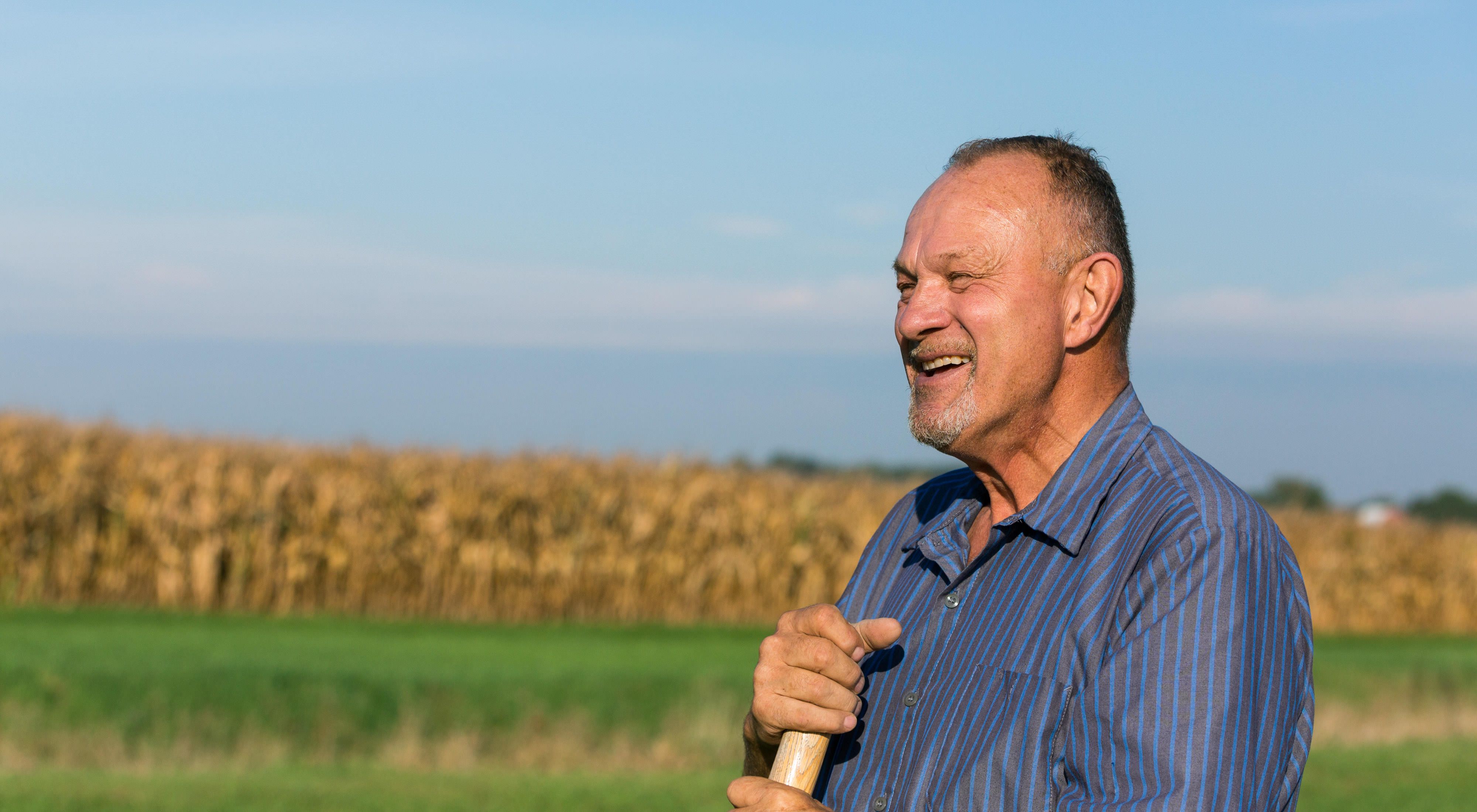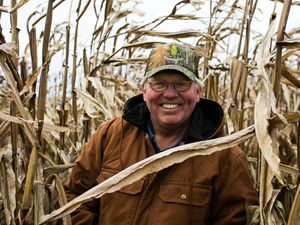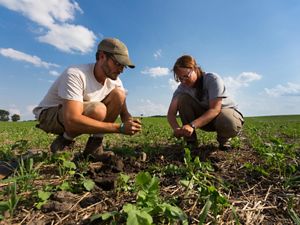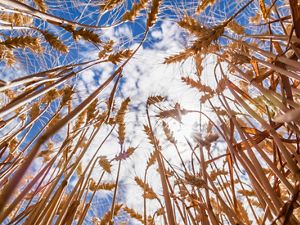Farmers at the Forefront of Soil Health
See how other farmers are building a sustainable future on their lands.
See Their StoriesFarming is in Brian Roemke’s blood. He grew up on the family farm in Allen County, Indiana, which his grandfather started in 1914 with 300 acres. In partnership with his two brothers, Brian bought his first piece of farmland to add to the family acreage in 1978 and has been earning a living on the family farm for more than 40 years. He feels it’s time to give back.
Roemke Farms now consists of about 1,000 acres located along a rural state highway. The Roemkes farm an additional 2,800 nearby acres that they rent. They grow primarily corn and soybeans. The land is flat out here in the Indiana countryside, and you can see for miles across dark green farm fields in any direction. In the heat of late summer, you can smell the rich soil and the growing corn.
Today Roemke Farms is owned by Brian’s brother Mark and Mark’s sons John and Adam. Brian sold his share of the farmland to John and Adam in 2008. But he loves the farm life so much, he still works full-time on the farm as an employee.
“I just enjoy going to work every day,” he says with a laugh. “I love it. I just have that love for nature and the earth. And after farming for 40-plus years, I know exactly what needs to be done every day.”
Quote: Brian Roemke
Soil health is a focus here at Roemke Farms because it increases the productivity of the farm, and long-term it’s going to be there for the next generation."
Leaving a Legacy
Brian stays involved with the family farm not only because he loves it but also because he wants to help ensure that the land is taken care of so it can be handed down to the next generation and the generations after that. “You feel a responsibility to do whatever you can to preserve this kind of lifestyle, this productivity, this soil health for that generation and generations to come,” he says.
Because he wants to leave a strong legacy, Brian is committed to conservation practices that improve soil health and the long-term productivity of the family farmland. “Soil health is a focus here at Roemke Farms because it increases the productivity of the farm, and long-term it’s going to be there for the next generation,” he says. “We’re trying to build back what Mother Nature was giving us originally when it had its natural habitat out here.”
No-till planting and cover cropping have been two key conservation practices that have paid dividends for the Roemkes, both financially and in improved soil health. No-till is planting without plowing the soil. Cover cropping is planting noncash crops in the off-seasons to reduce erosion and return nutrients and moisture to the soil. The Roemkes initially got involved in no-till in 2001 to reduce their costs. Once they added cover crops to the mix in 2014, they really began to see the benefits in soil health.
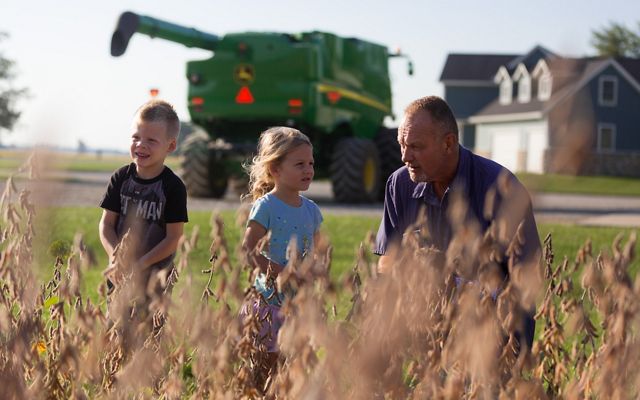
The Advantages of Conservation Practices
“With no-till, and now with cover crops helping to soften those raindrops,” he says, “we don’t have as many issues as we did back in the day with crusty soils and getting crop erosion. Because you’ve got the crop residue out there helping to protect the soil to soften that blow. We’ve got more earthworm activity, and we’re creating more organic matter, so we’ve got a better soil for the seed to go into.
“The longer you plant cover crops, the more the crops will actually do the tilling of the soil for you. Creating the air channels. Creating the spongelike effect of the earthworms and the microbes to absorb the rainwater. . . . The earthworms are very visible in our soil. You can take a shovel and you can go out there, and you can see those earthworm holes. And when you see 15 earthworm holes in a clod of dirt the size of your hand, you know you’ve got good soil health.”
Being Proactive to Protect Water Supplies
Another key conservation practice of Roemke Farms is nutrient management—controlling how nutrients like nitrogen and phosphorus fertilizers are applied to prevent excess from getting into waterways and affecting water supplies. The best way to do that is to follow what are known as the 4Rs—right source, right rate, right time and right place.
Brian notes that because the farm is in the Lake Erie watershed, it’s important to him to keep excess nutrients from flowing off the farm and down to Lake Erie. In 2014, toxic algae blooms from nutrients in Lake Erie caused a water supply shutdown in Toledo for three days, affecting hundreds of thousands of people. “We need to be proactive,” he says. “Water quality and water issues are really high on our minds.”
Brian says he first heard the term “soil health” in 2015 when Roemke Farms signed on to be a demonstration farm for the Soil Health Partnership (SHP), a farmer-led initiative of the National Corn Growers’ Association. SHP is testing and measuring the economic and environmental impact of conservation practices on more than 140 demonstration sites on working farms in 14 states. Brian is grateful that SHP is helping Roemke Farms to run trials and collect data on farming practices in order to learn which ones work best.
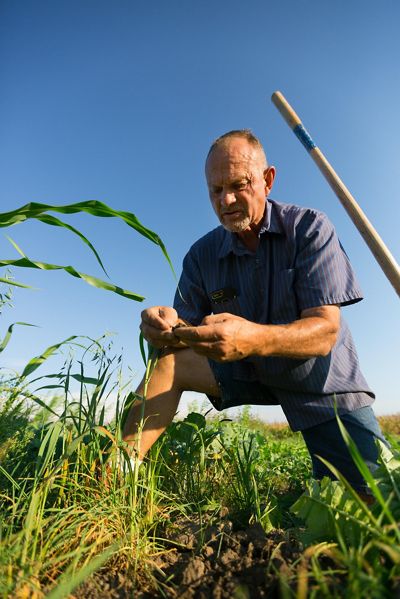
Spreading the Word About Good Practices
In addition, Brian says, the Soil Health Partnership helped him become a spokesperson for conservation farming practices. “Networking with like-minded people and going to [the Soil Health Partnership’s] Soil Health Summit has improved my ability to get up and speak about these good farming practices,” he says.
“Brian is definitely one of the conservation leaders among farmers in this region,” says Alex Fiock, Northern Indiana field manager for the Soil Health Partnership. “He is passionate about soil health. He and the whole Roemke family really understand the importance of conservation and our work at the Soil Health Partnership. He’s been very helpful in sharing information with neighboring farms.”
One way Brian and his family are sharing information with the local farming community is through speaking at field days at Roemke Farms, where other farmers can visit and learn about conservation practices. They average about 200 attendees for each field day, according to Fiock.
Another way Brian is contributing is through his work behind the scenes to help get the 4R Nutrient Stewardship Certification Program included in the Indiana Farm Bureau manual as a recommended practice for agricultural retailers, service providers and other certified professionals.
“Brian was very influential in reaching out to folks to help get the 4Rs into the Farm Bureau manual,” says Carrie Vollmer-Sanders, nutrient strategy manager for The Nature Conservancy. “When you have farmer leaders like Brian saying to fellow farmers that they should follow the 4Rs, it is an idea that spreads and takes hold.”
Brian Roemke feels he’s contributing now in ways that matter deeply to him: improving soil health on the family farm for the next generations, taking care of the local environment and enlisting fellow farmers to adopt good soil health and nutrient management practices. “At Roemke Farms, we’re putting down a foundation for generations to come with cover crops, no-till, variable rate fertilizer applications, putting the right nutrients in the right place at the right amounts at the right time,” he says. “It gives me a feeling of peace and contentment. It’s a feeling of leaving a good legacy.”
